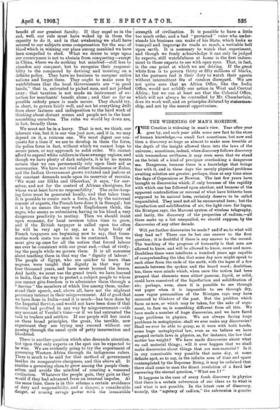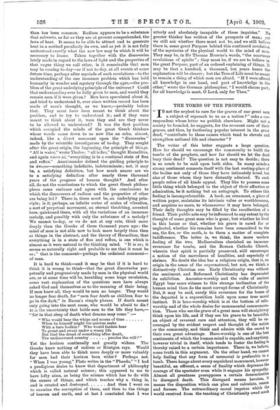THE WIDENING OF MAN'S HORIZON. T HE Creation is widening in
man's view. Year after year goes by, and each year adds some new fact to the store of human knowledge,—a small fact sometimes, but now and then a discovery so huge as almost to make men tremble at the depth of the insight allowed them into the laws of the universe ; sometimes, indeed, when discovery follows discovery with tremendous swiftness,:it may even seem that we stand on the brink of a kind of precipice overlooking a dangerous sea. Dangerous, because there is a knowledge that brings fear with it, and in these days the merely physical problems awaiting solution are greater, perhaps, than at any time since the days of Copernicus or Newton. The last few years have brought us discoveries which, if only because of the rapidity with which one has followed upon another, and because of the apparent contradiction or reversal of what have hitherto been supposed to be natural laws, certainly deserve to be called unparalleled. They need not all be enumerated here; but the liquefaction and solidification of air, the light cure for lupus, the Röntgen rays, the Marconi system of wireless telegraphy, and lastly, the discovery of the properties of radium,—all these make up a list unequalled, we should suppose, by the discoveries of any other decade.
Will yet further discoveries be made ? and if so, to what will they lead us ? There can be but one answer to the first question; it is doubtful if there is any answer to the second. The teaching of the progress of humanity is that men are allowed to know, and will be allowed to know, more and more. Doubtless there were intellects a hundred years ago capable of comprehending the idea that some day men might speak to each other from the ends 'of the earth, with the lapse of a few seconds between the spoken and the heard word ; doubtless. too, there were minds which, when once the notion had been- grasped that elements were eithee gaseous, liquid, or solid,. could have conceived of the liquefaction and solidification of air; perhaps, even, since it is possible to see through wet paper when it is impossible to see through dry, some vague premonition of the Röntgen rays may have occurred to thinkers of the past. But the problem which faces us now, or which may be taken, for the sake of argu- ment, to face us, is something different from all this. We have made a number of huge discoveries, and we have faced huge problems in physics. We are always facing huge problems in metaphysics: shall we ever make any discoveries? Shall we ever be able to grasp, as it were with both hands, some huge metaphysical law, even as we believe we have grasped certain laws in physics, as, for instance, the law that matter has weight? We have made discoveries about what we call material things ; . will it ever happen that we shall make discoveries about things that are non-material ? Is it in any conceivable way possible that some day, at some definite spot, so to say, in the infinite area of time and space contemplated by the Supreme Being, it may be ordained that there shall come to man the direct revelation of a fixed law. answering the eternal question, "What am I ? "
It happens in the case of every fresh discovery in physics that there is a certain subversion of our ideas as to what is and what is not possible. In the latest case of discovery, namely, the "mystery of radium," the subversion is greater
than has been common. Radium appears to be a substance that subverts, as far as they are at present comprehended, the laws of heat. It seems to be able to attract and to generate heat in a method peculiarly its own, and as yet it is not fully understood exactly what the new law may be which it will be necessary to frame. Taken together with the discoveries lately made in regard to the laws of light and the properties of that vague thing we call ether, is it conceivable that men may be coming to-day--or if not to-day, at all events at some future time, perhaps after myriads of such revelations—to the understanding of the one immense problem which has held humanity in wonder and mystery through the ages,—the pro- blem of the great underlying principle of the universe ? Could that understanding ever be fully given to men, and would they remain men if it were given? Men have speculated about it, and tried to understand it, ever since written record has been made of man's thought, as we know,—probably before that. They must have been meant to think about the problem, and to try to understand it ; and if they were meant to think about it, were they and are they never to be allowed to understand? It was the first problem which occupied the minds of the great Greek thinkers whose words come down to us now like an echo, almost, indeed, like a direct comment upon the " discoveries " made by the scientific investigators of to-day. They sought after the great origin, the beginning, the principle of things. "All is water," wrote Tholes; "all is fire," thought Heraclitus, and again greir.-a hi, "everything is in a continual state of flux and reflux." Anaximander defined the guiding principle to be 41mm—something indefinite, indeterminate ; not, it may be, a satisfying definition, but how much nearer are we to a satisfying definition after nearly three thousand years of the progress of human thought? And after all, do not the conclusions to which the great Greek philoso- phers came embrace and agree with the conclusions to which the discoverers of radium and the properties of ether are being led ? There is, there must be, an underlying prin- ciple; is it, perhaps, an infinite series of scales of vibration, a sort of perpetual movement, an eternal throbbing, arrested here, quickened there, with all the variations of an immense melody, and possibly with only the substance of a melody? We cannot to-day, or we do not at any rate, think more deeply than the Greeks of three thousand years ago : the mind of men is not able now to look more largely than then at things in the abstract, and the theory of Heraclitus, that everything is in a state of flux and reflux, is one which is almost as it were natural to the thinking mind. "It is so; it seems so naturally right and probable to me that it must be so ; " that is the comment—perhaps the ordained comment— of man.
It is hard to think—and it may be that if it is hard to think it is wrong to think—that the great discoveries per- petually and progressively made by men in the physical world are, or at some time will be, heralding some huge revelation, some vast explanation of the questions men have always asked God and themselves as to the meaning of their being. If men knew all, they would be men no longer. They would no longer fear death, for "men fear death as children fear to go in the dark," in Bacon's simple phrase. If death meant only going into the next room, who would be afraid to die ? it is the uncertainty that holds men to the life they have,- ' for in that sleep of death what dreams may come" :—
" Who would bear the whips and scorns of time
When he himself might his quietus make With a bare bodkin? Who would fardels bear To grunt and sweat under a weary life But that the dread of something after death, The undiscovered country puzzles the will ? "
Yet the horizon continually and greatly widens. The Greeks knew nothing of radium or Röntgen rays. Would they have been able to think more deeply or more valuably for men had their horizon been wider? Perhaps not. "When I was young," Plato writes in the " Phaedo," "I had a prodigious desire to know that department of philosophy which is called natural science; this appeared to me to have lofty aims, as being the science which has to do with the causes of things, and which teaches why a thing is, and is created and destroyed And then I went on to examine the corruption of them, and then to the things of heaven and earth, and at last I concluded that I was
utterly and absolutely incapable of these inquiries." No greater thinker has written of the prospects of man; yet we still ask whether there must not be, and we still believe there is, some great Purpose behind this continued revelation of the mysteries of the physical world to the mind of mail They may be, in Sir Thomas Browne's words, "the courteous revelations of spirits ' ; they must be, if we are to believe in the great Purpose, part of an ordered explaining of things. It may be that a hundred, a thousand, ten years hence the explanation will be clearer; but the Tree of Life must be meant to remain a thing of which men are afraid. "If I were offered all knowledge in one hand, and part of knowledge in the other," wrote the German philosopher, "I would choose part; for all knowledge is meet, 0 Lord, only for Thee."











































 Previous page
Previous page